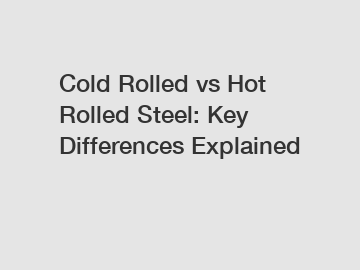Apr. 05, 2024
Cold Rolled vs Hot Rolled Steel: Key Differences Explained.
Steel is one of the most commonly used materials in various industries such as construction, manufacturing, and transportation. When it comes to steel production, two main methods are used: cold rolling and hot rolling. These processes result in differences in the properties and characteristics of the finished steel products. Understanding the distinctions between cold rolled and hot rolled steel is crucial for choosing the right material for a specific application.
Main Differences.

Cold Rolled Steel:
When steel is cold rolled, it is first passed through a pair of rollers at room temperature. This process results in a thinner and stronger product compared to hot rolled steel. Cold rolled steel undergoes a process of annealing, which involves heating the steel to a high temperature and then cooling it slowly to improve its ductility and strength. As a result, cold rolled steel is more suitable for applications that require precise shapes and tight tolerances.
Hot Rolled Steel:
In contrast, hot rolled steel is produced at extremely high temperatures, typically above 1700 degrees Fahrenheit. The steel is malleable and easy to shape during the hot rolling process. Hot rolled steel is less precise in terms of dimensions and has a rougher surface compared to cold rolled steel. However, hot rolled steel is ideal for applications that do not require high precision and where the appearance is not a critical factor.
Strength and Hardness:
One of the key differences between cold rolled and hot rolled steel is their strength and hardness. Cold rolled steel typically has a higher tensile strength and hardness than hot rolled steel. The cold rolling process allows for greater control over the final properties of the steel, resulting in a product that is more suitable for applications that require high strength and hardness, such as automotive parts and appliances.
Surface Finish:
Another important distinction between cold rolled and hot rolled steel is the surface finish. Cold rolled steel has a smooth, matte finish, while hot rolled steel has a rough, scaly surface. The surface finish of cold rolled steel is more aesthetically pleasing and is often preferred for applications where appearance matters. On the other hand, the rough surface of hot rolled steel is typically covered with a layer of mill scale, which needs to be removed before painting or finishing.
Cost and Production:
From a cost perspective, cold rolled steel is generally more expensive than hot rolled steel due to the additional processing steps involved in the cold rolling process. However, the higher cost of cold rolled steel is justified by its superior properties and performance in specific applications. Hot rolled steel, on the other hand, is more cost-effective and is commonly used in large-scale manufacturing processes where precision is not critical.
Conclusion:
In conclusion, the choice between cold rolled and hot rolled steel depends on the specific requirements of the application. Cold rolled steel offers better strength, hardness, and surface finish, making it suitable for precision applications. Hot rolled steel, on the other hand, is more cost-effective and easy to work with, making it ideal for large-scale manufacturing. Understanding the key differences between these two types of steel is essential for making informed decisions when selecting materials for a project.
Contact Us.
If you have any questions or need assistance in choosing the right type of steel for your project, feel free to contact us. Our team of experts is here to help you make the best decision based on your specific requirements.
Are you interested in learning more about coil manufacturing industry, discount color coated steel coil, coiled wire rod? Contact us today to secure an expert consultation!
Previous: What is galvanneal steel used for?
Next: None
If you are interested in sending in a Guest Blogger Submission,welcome to write for us!
All Comments ( 0 )